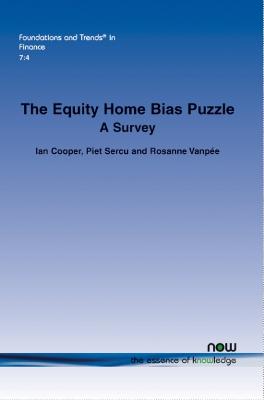Foundations and Trends (R) in Finance
1 total work
The Equity Home Bias Puzzle
by Ian Cooper, Piet Sercu, and Rosanne Vanpee
Published 30 December 2013
The Equity Home Bias Puzzle: A Survey puts into perspective one of the strongest and most persistent empirical phenomena in finance: equity home bias. The authors not only provide a thorough review of the competing Measures of home bias and the explanations for the equity home bias proposed in the current literature, but also lay out the implications of international under-diversification for portfolio formation and the cost of capital of companies.
The Equity Home Bias Puzzle: A Survey is organized as follows. After an introduction, Section 1 defines the equity home bias puzzle and explains why it is important. Section 2 reviews the two main methods used to quantify equity home bias, the positive and normative approaches, and shows how alternative home bias Measures can be constructed using variations or combinations of these two methods. In Section 3 the authors explain the economic significance of under-diversification by estimating the total implied discount and then go on to review the various explanations for equity home bias-ultimately concluding that each explanation on its own is not sufficient, suggesting, in Section 4, that equity home bias reflects a combination of factors. Section 5 lays out the implications of home bias for investment and corporate finance and Section 6 concludes that no version of standard portfolio theory alone has been able to explain it.
The Equity Home Bias Puzzle: A Survey is organized as follows. After an introduction, Section 1 defines the equity home bias puzzle and explains why it is important. Section 2 reviews the two main methods used to quantify equity home bias, the positive and normative approaches, and shows how alternative home bias Measures can be constructed using variations or combinations of these two methods. In Section 3 the authors explain the economic significance of under-diversification by estimating the total implied discount and then go on to review the various explanations for equity home bias-ultimately concluding that each explanation on its own is not sufficient, suggesting, in Section 4, that equity home bias reflects a combination of factors. Section 5 lays out the implications of home bias for investment and corporate finance and Section 6 concludes that no version of standard portfolio theory alone has been able to explain it.
